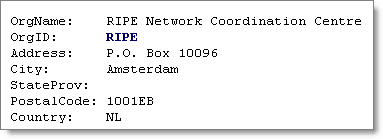What have we come to? This really makes me sick. I just got this (unapproved) comment on my JibberJobber blog:

There were some yellow flags that made me think this *might* be a spam comment:
- The blog post is pretty old… most of the time if I get a comment on a post older than 2 weeks it is spam, and
- The comment itself is without substance.
Nonetheless, I thought maybe it was legit… but then something really caught my eye… look at the commenter’s URL:
![]()
Ripoff Report? Seriously? Someone wants a link to the ripoff report? Now my curiosity is piqued.
So I click on the link, and indeed the name of the commenter will be hyperlinked to a report on Ripoff Report. The event has to do with a doctor (vet) who apparently did something wrong…
It gets better.
The person who took their dog in to this vet is probably not the same person who left this comment. Check this out – when I click the Whois link (this one, again, from the image above):
… I find out the person who left this comment is in Amsterdam.

From this, I’m guessing that the person who is mad at his/her vet hired a person or firm to spread libelous comments on the internet, with the intention of doing regular ol’ SEO. Not cool.
In fact, quite disgusting.
Note to the vet: Dr. what’syourname (I’m not going to say here, as he/she doesn’t deserve any bad link bait or negative SEO (yes, it’s in the top image, but search engines aren’t smart enough to figure that out)), there are tactics to get rid of this that are quite easy…. drop me a note and I’m happy to introduce you to my colleagues who specialize in this type of stuff (or go to ReachCC.com to find them yourself).
Note to person who is responsible for this filth: thanks a lot. I was just getting my faith in humanity restored, and then I have to see this crap.
Jason, I believe those types of comments are left by bots.
From wikipedia:
“Spam in blogs (also called simply blog spam or comment spam) is a form of spamdexing. It is done by automatically posting random comments or promoting commercial services to blogs, wikis, guestbooks, or other publicly accessible online discussion boards. Any web application that accepts and displays hyperlinks submitted by visitors may be a target.
Adding links that point to the spammer’s web site artificially increases the site’s search engine ranking. An increased ranking often results in the spammer’s commercial site being listed ahead of other sites for certain searches, increasing the number of potential visitors and paying customers.”
I highly recommend Akismet and perhaps putting a “nofollow” attribute on links in comments…
I went through something similar back in 2006 when I pissed off a spammer. It’s no fun, and it takes some work to counteract it. You’ll get no help from the FTC, the FBI or anyone else.